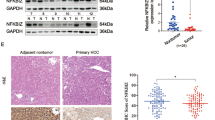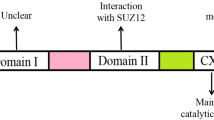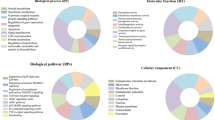Abstract
To study the inhibitory effect of nuclear transcription factor-kappa B(NF-κB) antisense oligodeoxynucleotide(ASODN) on the growth and tumorgenesis of human gastric cancer. We synthesized and transfected the ASODN of NF-κB/P65 to gastric cancer cell line. The effect of ASODN of NF-κB/P65 on the proliferation of gastric cancer cells was measured by MTT method. The subcutaneous xenograft model of human gastric cancer was established in nude mice, and the tumor growth curve was observed. The cell proliferation was significantly inhibited in P65 ASODN-transfected group in vitro (P < 0.05). In vivo, tumor formation test showed that the tumor volume in nude mice in ASODN group was obviously smaller than in other groups (P < 0.05); the apoptosis index (AI) was significantly higher (P < 0.001). Simultaneously, MVD in ASODN group was markedly lower than in other groups (P < 0.01). NF-κB could be used as a new biological therapeutic target of gastric cancer.





Similar content being viewed by others
Abbreviations
- NF-κB:
-
Nuclear transcription factor-kappa B
- ASODN:
-
Antisense oligodeoxynucleotide
- MSODN:
-
Missense oligodeoxynucleotide
- MTT:
-
3-(4,5)-dimethylthiahiazo(-z-y1)-3,5-di- phenytetrazoliumromide
- DMSO:
-
Dimethyl sulfoxide
- TUNEL:
-
TdT-mediated dUTP nick end labeling
- MVD:
-
Microvessel density
- AI:
-
Apoptosis index
References
Lin Y, Bai L, Chen W, Xu S (2010) The NF-κB activation pathways, emerging molecular targets for cancer prevention and therapy. Expert Opin Ther Targets 14:45–55
Aggarwal BB (2004) Nuclear factor-κB: the enemy within. Cancer Cell 6:203–208
Singh NP, Nagarkatti M, Nagarkatti PS (2007) Role of dioxin response element and nuclear factor-κB motifs in 2,3,7,8-tetrachlorodibenzo-p-dioxin-mediated regulation of Fas and Fas ligand expression. Mol Pharmacol 71:145–157
Kim JY, Lee S, Hwangbo B, Lee CT, Kim YW, Han SK, Shim YS, Yoo CG (2000) NF-kappaB activation is related to the resistance of lung cancer cells to TNF-alpha-induced apoptosis. Biochem Biophys Res Commun 273:140–146
Wang P, Qiu W, Dudgeon C, Liu H, Huang C, Zambetti GP, Yu J, Zhang L (2009) PUMA is directly activated by NF-κB and contributes to TNF-α-induced apoptosis. Cell Death Differ 16:1192–1202
Karin M (2006) Nuclear factor-κB in cancer development and progression. Nature 441:431–436
Romieu-Mourez R, Landesman-Bollag E, Seldin DC, Sonenshein GE (2002) Protein kinase CK2 promotes aberrant activation of nuclear factor-κB, transformed phenotype, and survival of breast cancer cells. Cancer Res 62:6770–6778
Inoue J, Gohda J, Akiyama T, Semba K (2007) NF-kappaB activation in development and progression of cancer. Cancer Sci 98:268–274
Qi Li, Yu YY, Zhu ZG, Ji YB, Zhang Y, Liu BY, Chen XH, Lin YZ (2005) Effect of NF-κB constitutive activation on proliferation and apoptosis of gastric cancer cell lines. Eur Surg Res 37:105–110
Yingyan Yu, Li Q, Zhu Z (2005) NF-κB as a new therapeutic target in the gastric cancer. Eur J Surg Oncol 31:386–392
Trojan J, Ly A, Wei MX, Bierwagen M, Kopinski P, Pan Y, Ardourel MY, Dufour T, Shevelev A, Trojan LA, François JC, Andres C, Popiela T, Chatel M, Kasprzak H, Anthony DD, Duc HT (2010) Antisense anti IGF-I cellular therapy of malignant tumours: Immune response in cancer patients. Biomed Pharmacother 64:576–578
Sridhar SS, Canil CM, Chi KN, Hotte SJ, Ernst S, Wang L, Chen EX, Juhasz A, Yen Y, Murray P, Zwiebel JA, Moore MJ (2011) A phase II study of the antisense oligonucleotide GTI-2040 plus docetaxel and prednisone as first-line treatment in castration-resistant prostate cancer. Cancer Chemother Pharmacol 67:927–933
Fidias P, Pennell NA, Boral AL, Shapiro GI, Skarin AT, Eder JP Jr, Kwoh TJ, Geary RS, Johnson BE, Lynch TJ, Supko JG (2009) Phase I study of the c-raf-1 antisense oligonucleotide ISIS 5132 in combination with carboplatin and paclitaxel in patients with previously untreated, advanced non-small cell lung cancer. J Thorac Oncol 4:1156–1162
Leonetti C, Zupi G (2007) Targeting different signaling pathways with antisense oligonucleotides combination for cancer therapy. Curr Pharm Des 13:463–470
Miyake H, Hara I, Fujisawa M, Gleave ME (2006) The potential of clusterin inhibiting antisense oligodeoxynucleotide therapy for prostate cancer. Expert Opin Investig Drugs 15:507–517
Reuning U, Wilhelm O, Nishiguchi T, Guerrini L, Blasi F, Graeff H, Schmitt M (1995) Inhibition of NF-kappa B-Rel A expression by antisense oligodeoxynucleotides suppresses synthesis of urokinase-type plasminogen activator (uPA) but not its inhibitor PAI-1. Nucleic Acids Res 23:3887–3893
Sen R, Baltimore D (1986) Multiple nuclear factors interact with the immunoglobulin enhancer sequences. Cell 46:705–716
Nakajima H, Fujiwara H, Furuichi Y, Tanaka K, Shimbara N (2008) A novel small-molecule inhibitor of NF-kappaB signaling. Biochem Biophys Res Commun 368:1007–1013
Katdare M, Efimova EV, Labay E, Khodarev NN, Darga TE, Garofalo M, Nakamura S, Kufe DW, Posner MC, Weichselbaum RR (2007) Diverse TNFalpha-induced death pathways are enhanced by inhibition of NF-kappaB. Int J Oncol 31:1519–1528
Aggarwal BB, Vijayalekshmi RV, Sung B (2009) Targeting inflammatory pathways for prevention and therapy of cancer: short-term friend, long-term foe. Clin Cancer Res 15:425–430
Bhat-Nakshatri P, Sweeney CJ, Nakshatri H (2002) Identification of signal transduction pathways involved in constitutive NF-kappaB activation in breast cancer cells. Oncogene 21:2066–2078
Harikumar KB, Kunnumakkara AB, Ochi N, Tong Z, Deorukhkar A, Sung B, Kelland L, Jamieson S, Sutherland R, Raynham T, Charles M, Bagherzadeh A, Foxton C, Boakes A, Farooq M, Maru D, Diagaradjane P, Matsuo Y, Sinnett-Smith J, Gelovani J, Krishnan S, Aggarwal BB, Rozengurt E, Ireson CR, Guha S (2010) A novel small-molecule inhibitor of protein kinase D blocks pancreatic cancer growth in vitro and in vivo. Mol Cancer Ther 9:1136–1146
Joyce D, Albanese C, Steer J, Fu M, Bouzahzah B, Pestell RG (2001) NF-kappaB and cell-cycle regulation: the cyclin connection. Cytokine Growth Factor Rev 12:73–90
Toualbi-Abed K, Daniel F, Güller MC, Legrand A, Mauriz JL, Mauviel A, Bernuau D (2008) Jun D cooperates with p65 to activate the proximal kappaB site of the cyclin D1 promoter: role of PI3 K/PDK-1. Carcinogenesis 29:536–543
Schmidt D, Textor B, Pein OT, Licht AH, Andrecht S, Sator-Schmitt M, Fusenig NE, Angel P, Schorpp-Kistner M (2007) Critical role for NF-κB-induced JunB in VEGF regulation and tumor angiogenesis. EMBO J 26:710–719
Sakamoto K, Maeda S, Hikiba Y, Nakagawa H, Hayakawa Y, Shibata W, Yanai A, Ogura K, Omata M (2009) Constitutive NF-κB activation in colorectal carcinoma plays a key role in angiogenesis, promoting tumor growth. Clin Cancer Res 15:2248–2258
Mees C, Nemunaitis J, Senzer N (2008) Transcription factors: their potential as targets for an individualized therapeutic approach to cancer. Cancer Gene Ther 16:103–112
Long YM, Ye S, Rong J, Xie WR (2009) Induction of apoptosis in human liver carcinoma HepG2 cell line by 5-allyl-7-gen-difluoromethylenechrysin. World J Gastroenterol 15:2234–2239
Li TJ, Jia LP, Gao XL, Huang AL (2006) Gene therapy that inhibits NF-kappaB results in apoptosis of human hepatocarcinoma by recombinant adenovirus. World J Gastroenterol 33:5287–5292
Acknowledgments
This study was supported by Grants from National Nature Science Foundation of China (No. 81071664), Shanghai National Natural Science Fund (No. 10ZR1424200) and Shanghai Municipal Health Bureau Fund (2009157).
Conflict of interest
None.
Author information
Authors and Affiliations
Corresponding authors
Additional information
Qi Li and Yong Gao contributed equally to this work and should be considered first authors.
Electronic supplementary material
Below is the link to the electronic supplementary material.

10238_2011_174_MOESM1_ESM.jpg
Supplementary material 1. S1. Histograms show AI in different groups. There was statistically significant difference between ASODN group and the other groups (P < 0.001). (JPEG 176 kb)

10238_2011_174_MOESM2_ESM.jpg
Supplementary material 2. S2. Histograms show MVD in different groups. There was statistically significant difference between ASODN group and the other groups (P < 0.01). (JPEG 170 kb)
Rights and permissions
About this article
Cite this article
Li, Q., Gao, Y., Xu, Zg. et al. Effect of antisense oligodeoxynucleotide targeted against NF-κB/P65 on cell proliferation and tumorigenesis of gastric cancer. Clin Exp Med 13, 11–19 (2013). https://doi.org/10.1007/s10238-011-0174-1
Received:
Accepted:
Published:
Issue Date:
DOI: https://doi.org/10.1007/s10238-011-0174-1




